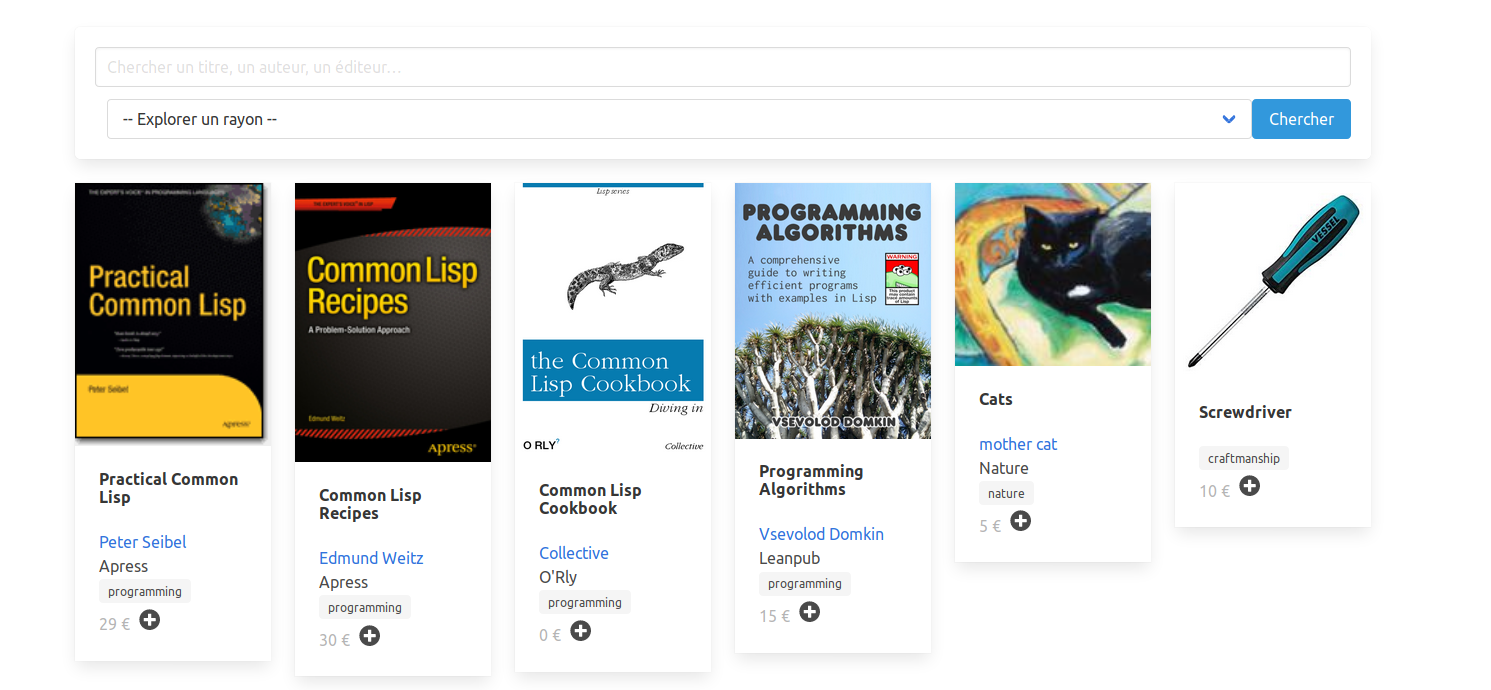I wrote a free software for bookshops to publish their catalogue online. Clients can now browse the available books and order them. It is enough generic so we can show other products too.
- https://abstock.gitlab.io/#/en/
- sources and bug tracker: https://gitlab.com/vindarel/abstock
- Github mirror: https://github.com/vindarel/ABStock
- the demo
Here’s how a search result looks like:

Features
The website is made generic enough for different clients, and is made totally hackable with pre- and post- configuration files that load your Lisp logic.
By default we get the following pages:
- the welcome screen, with:
- the bookshop’s information,
- the search form. We can search by title, authors, publisher, shelf and ISBN(s).
- a random pre-selection of the books to showcase, if enabled.
- an optional special page to showcase a selection of books or other products.
- in the search results page, visitors can add a book to their shopping basket.
- and in the basket page, they find a confirmation form, which sends the command by email to the shop owner.
There are obvious TODOs, that could be shocking by their absence, but that I actually don’t need yet, so they’ll come right in time :)
- online payment
- admin page
- simple stats (they are brought in with the email provider, and with Matomo statistics)
- i18n, remove a still few hardcoded words
Data
ABStock connects by default to the Abelujo database. Abelujo is a free software for bookshops that I also develop. Booksellers use it for their daily work, registering and selling books.
But we can define our own products. The current possibility is
to use a cards.txt file. Each block expects a title, and that’s
the only mandatory field. Other recognized fields are:
((:|id| integer)
:|title|
:|cover|
:|isbn|
:|price|
:|author|
:|publisher|
:|date_publication|
:|date-publication|
:|shelf|
:|shelf_id|
:|details-url|
:|summary|
:|quantity|
:|repr|
:|repr2|)
We can define other fields, like likes below, which is
actually unused in the application.
[…]
title: Programming Algorithms
author: Vsevolod Domkin
cover: https://d2sofvawe08yqg.cloudfront.net/progalgs/hero?1586867024
details-url: https://leanpub.com/progalgs
shelf: programming
shelf_id: 99
publisher: Leanpub
price: 15
likes: 5
title: Cats
author: mother cat
cover: https://gitlab.com/abstock/abstock.gitlab.io/-/raw/master/logo.png
details-url: https://gitlab.com/abstock/abstock.gitlab.io/-/blob/master/logo.png
shelf: nature
shelf_id: 98
publisher: nature
price: 5
likes: 100
title: Screwdriver
author:
cover: https://external-content.duckduckgo.com/iu/?u=https%3A%2F%2Ftse1.mm.bing.net%2Fth%3Fid%3DOIP.jGOb7dVL1oA9VDzNVPDPpwAAAA%26pid%3DApi&f=1
details-url:
shelf: craftmanship
shelf_id: 97
publisher:
price: 10
likes: 1
(yes there’s a little redundancy with shelf and shelf_id to fix)
That gives:

We could very well load a JSON, a CSV or another database when the need arises.
For now, we think the text loader is enough for you to define your products and try the application.
It is also very easy to host, and in doing so one can realize that to live-reload his Lisp web app is straighforward and very convenient.
Context
I shipped the app the second month of our lockdown period for the client I was working for at that moment, and no need to say it turned 100% helpful. Amazon had hell of an activity, and french alternatives for booksellers (such as lalibrairie.com or placedeslibraires.fr) either had stopped, either couldn’t accept new registrations. So we were left alone, and we did that. His clients were happy, they started passing orders, he organized collection schedules. This happened in a small rural village, where the inhabitants are happy to have, at least, a (nice) bookshop in their village.
Paying one’s rent with Lisp
So yes, I paid my rent with Common Lisp again \o/ And you see, the software is a classical web app. I could have made it with Python or another language that has a web server and a templating library. As I defended before, the app doesn’t exist thanks to CL’s super powers. CL had no particular advantages for this kind of web app, but no disavantages either: it has a good web framework, a good templating library that I liked a lot (Djula: defining custom filters was a breeze), a good SQL wrapper, and that’s all I asked. I use CL’s super powers during development and deployment. Clients wouldn’t see the difference… or would they?
Actually, CL has advantages overall: development speed, ease of deployment, ease of hot-reload, ease to use the language features to bypass a library’s limitation (easy-routes had no built-in to translate a route URL, but it turned possible with a reader macro)… not mentioning ease of maintenance in time, speed, etc.
One production bug I had was due to (me apart for not testing enough)
(= 3 nil) throwing an error, so you must had prior checks (or, I
just realize, use equalp?). My Sentry dashboard is empty anyways.
Final words (with bonus)
The Big Plan is to Rewrite It (the other software) In Lisp, and the project just moved from R&D to POW… stay tuned, particularly if you don’t know what to do in june and july, I might have a small budget for a helping hand.
| Become a Patron! |